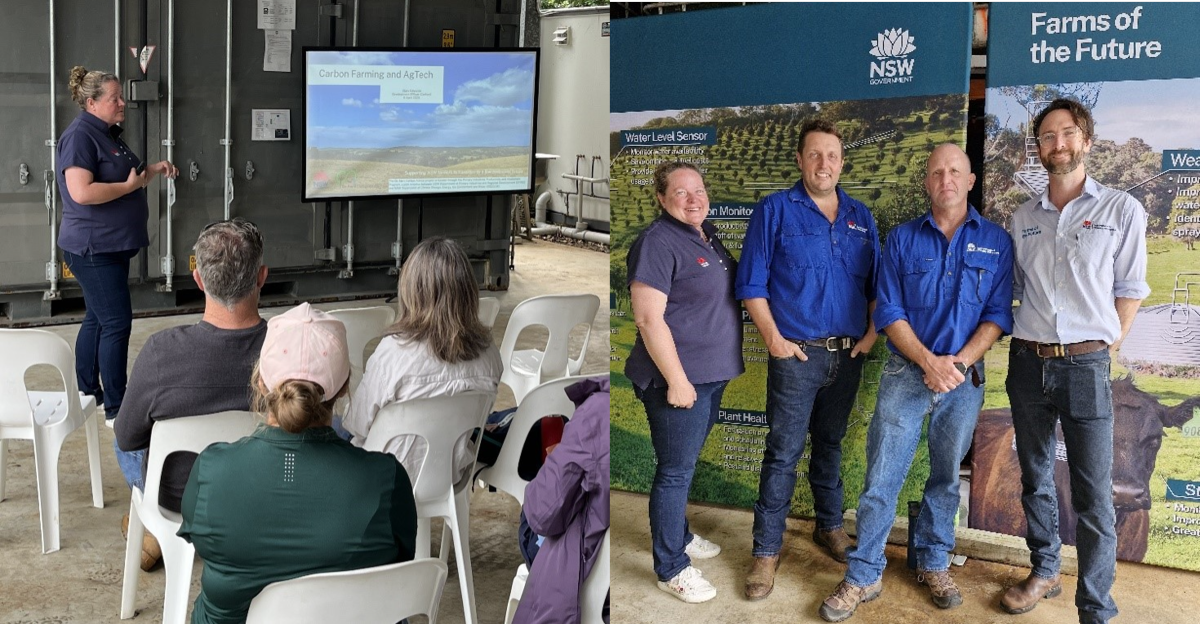On-farm Carbon Advice Newsletter - April 2025
We hope you and your family have had a well deserved break over Easter and Anzac Day.
The NSW Department of Primary Industries and Regional Development’s (DPIRD) On-farm Carbon Advice team are continuing to work on events, demonstration sites, webinars and farm carbon management plans. Recently, we were in Bendemeer delivering a Carbon Farming Fundamental workshop with North West Landcare. We also presented on “The big picture of on-farm emissions and carbon” with Hunter LLS at TOCAL, with Central West Local Land Services at Coonabarabran and Dubbo, and at a farming systems field day at Euabalong. Last week, DPIRD’s Farms of the Future and the On-farm Carbon Advice team held a joint demonstration field day at Clunes on the North Coast. The Field Day included presentations on a range of topics such as carbon farming, seasonal conditions and offered the opportunity for attendees to talk to AgTech suppliers about a range of Agtech solutions.

At the end of last year, a team of researchers published an informative article “Making soil carbon credits work for climate change mitigation” in the journal Carbon Management https://doi.org/10.1080/17583004.2024.2430780, based on soil carbon credits issued in 2023 from six grazing farms under the Soil Carbon 2021 ACCU scheme method. The article discusses how much rainfall impacts soil carbon, and therefore the risks, for soil carbon ACCU projects, of losing soil carbon credits if the measuring period is characterised by above average rainfall. The article recommends extending the ACCU method minimum measurement period to five years, to reduce the risks to farmers. It also recommends establishing science-based ranges for various soil carbon management practices, so farmers know what to expect in terms of long-term soil organic carbon gains*.
The ACCU scheme’s Soil Organic Carbon 2021 method is under review by the Emissions Reduction Assurance Committee (ERAC) with the consultation period now closed. Feedback from the consultation will inform the ERAC’s advice.
*Please note it is always recommended to seek independent advice before starting any carbon project.
Upcoming Events - May
Carbon Market Institute
The NSW Government is a proud sponsor of the Carbon Market Institute’s Carbon Farming Industry Forum.
The On-farm Carbon Advice team will be offering a Carbon Farming Fundamentals training at Lennox Head on 6 May prior to the commencement of the forum.
Primary producers can attend for FREE, by using the promo code “OFCA2025CMI” at checkout.
Local Land Services
The On-farm Carbon Advice team will also be presenting the “Big picture of on-farm emissions and carbon” at two Central Tablelands LLS events on 28 and 29 May
Webinar Series
The On-Farm Carbon Advice team is hosting an engaging webinar series on current policy work and research undertaken by DPIRD in low emissions agriculture. Topics include:
- designing pastures mixes to reduce emissions,
- low methane sheep and beef,
- nitrogen efficiency and novel fertilisers,
- opportunities to replace fossil fuels with renewable options.
To register your interest for our webinar series, or if you would like to watch the recordings of our two previous webinars (Dr Warwick Badgery speaking about soil carbon, its limits and opportunities, and Dr Aaron Simmons speaking about low emissions agriculture, its drivers, opportunities and risks)
Farm Carbon Management Plans
The team is now reviewing all expressions of interest received and will be in touch! If you are interested in completing a farm carbon management plan for your property, follow this link Expressions of Interest. The plan includes:
Emissions Profile: A detailed breakdown of on-farm emissions for a calendar or financial year, covering activities such as livestock management, cropping, fertiliser use, plant protection products, fuel, and energy.
Emissions Intensity: An estimate of emission intensities for your farm’s main products (how much emissions are emitted per tonne of products).
Mitigation Strategies: Information on practical options to reduce or prevent emissions on farm, and to achieve carbon sequestration, tailored to each farm’s capabilities and land potential.
Natural Asset Mapping: Mapping of the farm’s natural assets, including topography, soils, carbon stocks, and woody vegetation.
For more information follow this link Expressions of Interest.
Contact Us
For any other information on carbon farming, please feel free to contact us on carbon@dpird.nsw.gov.au